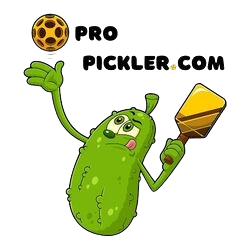Mastering the art of line calls in pickleball is crucial, especially when the game’s intensity ramps up and the ball zips around the court. Newbies often grapple with the timing of calling a ball “out” and the subsequent actions if they mistakenly hit it after their partner’s shout.
Let’s unravel this perplexing part of the game with some handy tips and insights from seasoned players.
When to Call ‘Out’ in Pickleball
Picture this: the ball is sailing towards the boundary, and your partner yells “out” just as you reflexively hit it back. Does the rally continue, or is the ball deemed dead? According to official pickleball rules, the answer hinges on the timing of your partner’s call and your next move:
- Rule 6.C.10: If a player shouts “out,” “no,” “bounce it,” or similar while the ball is airborne, it’s considered mere player communication and not an official line call.
- Rule 6.C.11: An “out” call made post-bounce is an official line call. The ball is dead, and play halts. If a referee overrules the “out” call upon appeal, it’s a fault against the caller. Exception: Line judges, if present, make the baseline and sideline calls.
In simpler terms, anything said while the ball is still in flight is just chatter. It aids your partner in decision-making but doesn’t stop the game. Only an “out” call made after the ball touches the ground counts as an official call, terminating the rally.
Player Communication: Alternatives to “Out”
Using “out” to communicate with your partner can muddle things and disrupt the game flow. Many players opt for alternative words to sidestep this issue. Here are some popular choices and insights from the pickleball community:
- “Bounce”: A swift and clear command indicating uncertainty, suggesting the ball should be allowed to bounce before making a play. One player shared, “I always say ‘bounce.’ It’s quick, easy to say, and can’t be mistaken for ‘out.'”
- “No”: Direct and simple. “No!” is probably the quickest and most direct call. Just make sure to communicate with your partner so they’re on the same page,” advises one experienced player.
- “Leave” or “Gone”: These are other effective terms. “I say ‘gone,’ and I often hear others use ‘no’,” mentioned a player who prefers clear, concise calls.
- “Drop it”: Some players prefer this phrase as it clearly suggests letting the ball hit the ground.
Pickleball Line Call Basics
Grasping line calls in pickleball can be a tad confusing. Here’s a quick guide to help you understand what “out” means, who makes the call, and the proper etiquette.
What Is “Out”?
A ball is “out” if it lands outside the court’s boundary lines. If it touches any part of the line, it’s considered in.
Who Calls “Out”?
- Players: The players on the side where the ball lands make the call. They have the best view.
- Partner Communication: Partners can signal each other while the ball is in the air, but these calls aren’t official until the ball bounces.
- Opponents: Opponents can question a call respectfully. If there’s a dispute, the call made by the players on the side where the ball landed generally stands.
Etiquette for Line Calls
- Be Honest: Always make fair calls. If unsure, give the benefit of the doubt to your opponents.
- Communicate Clearly: Use terms like “bounce,” “no,” “leave,” or “gone” to avoid confusion.
- Respect Calls: Respect your opponents’ calls and resolve disputes calmly.
- Stay Consistent: Be known for making fair, consistent calls.
- Be Loud and Clear: Make sure everyone can hear your call to avoid misunderstandings.
Understanding and making clear line calls keep the game fair and fun. Communicate with your partner, make honest calls, and respect others’ calls. This not only improves your game but also ensures a positive playing experience for everyone.
FAQ
Q. What happens if I hit the ball after my partner calls “out”?
If the ball is still in the air when your partner calls “out,” it is considered player communication and not an official call. The rally continues unless the ball bounces and an official “out” call is made.
Q. Can opponents challenge an “out” call?
Yes, opponents can respectfully question an “out” call. However, the call made by the players on the side where the ball landed generally stands unless there is a referee or line judge present to overrule it.
Q. What should I say instead of “out” to avoid confusion?
Use alternative terms like “bounce,” “no,” “leave,” or “gone” to communicate with your partner without causing confusion.
Q. How do I improve my accuracy in making line calls?
Practice and experience are key. Focus on watching the ball closely and communicating clearly with your partner. Always strive to make fair and honest calls.
Q. What should I do if I’m unsure whether the ball is in or out?
If you’re unsure, give the benefit of the doubt to your opponents. Making fair calls is crucial for maintaining sportsmanship and a positive playing experience.



